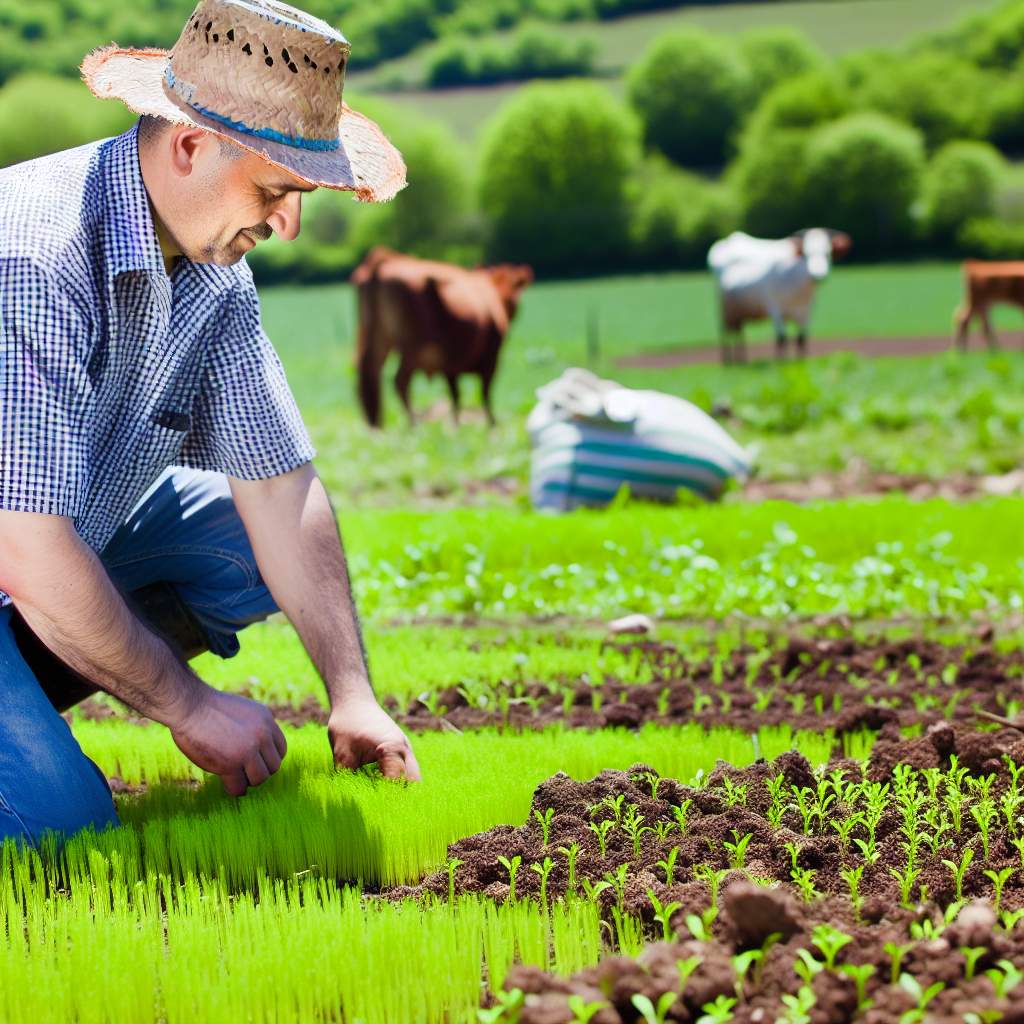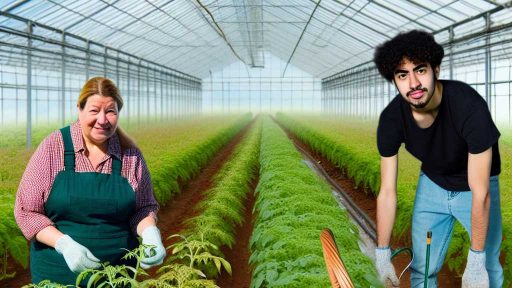Nutritional Benefits of Sprouts for Livestock and Poultry
Rich Source of Nutrients
Sprouts offer a concentrated source of vital nutrients.
They are rich in vitamins, minerals, and proteins.
This makes them an excellent addition to livestock diets.
Moreover, they contain essential amino acids for growth.
Transitioning from grains to sprouts enhances nutrient availability.
Improved Digestibility
Sprouting grains increases their digestibility significantly.
It breaks down complex structures, making nutrients more accessible.
Consequently, livestock can absorb nutrients more efficiently.
This leads to healthier animals and better feed conversion rates.
Boosting Immune Function
Sprouts contribute to improved immune function in livestock.
They are loaded with antioxidants that combat free radicals.
Additionally, vitamins such as Vitamin C play a vital role.
This enhances the overall health of poultry and livestock.
Higher Energy Levels
Feeding sprouts results in higher energy levels for animals.
This is crucial for active poultry and growing livestock.
Transform Your Agribusiness
Unlock your farm's potential with expert advice tailored to your needs. Get actionable steps that drive real results.
Get StartedMore energy translates into improved productivity and performance.
Farmers notice better weight gain and egg production rates.
Cost-Effective Feed Option
Growing sprouts can reduce overall feed costs significantly.
This is especially impactful for farmers on a budget.
They can cultivate sprouts in various settings, even indoors.
Thus, sprouts provide a sustainable and affordable feed source.
Environmental Benefits
Producing sprouts requires fewer resources compared to traditional feed.
They require less water and can be grown in small spaces.
This contributes to more sustainable farming practices.
Farmers can reduce their carbon footprint while maximizing yield.
Cost-Effectiveness of Growing Sprouts as Feed
Initial Investment and Setup
Starting a sprout growing operation requires minimal financial investment.
Equipment such as trays, water sources, and lighting can be acquired affordably.
This low startup cost makes sprouting accessible for many farmers.
Increased Nutritional Value
Sprouts offer enhanced nutritional profiles for livestock and poultry.
They are rich in vitamins, minerals, and proteins compared to traditional feed grains.
This nutritional boost can lead to healthier animals and improved growth rates.
Yield Efficiency
Growing sprouts can yield significant quantities of feed in a short time.
For instance, a small amount of seeds can produce large amounts of sprouts.
This efficiency reduces the need for larger amounts of traditional feed ingredients.
Reduced Feed Costs
By growing sprouts, farmers can lower their overall feed costs significantly.
Sprouts can be grown indoors or in small spaces, minimizing land usage.
Additionally, the cost of purchasing commercial feed can be reduced.
Improved Animal Health
Feeding sprouts to livestock and poultry can improve their overall health.
Healthier animals show better resistance to disease and lower mortality rates.
Showcase Your Farming Business
Publish your professional farming services profile on our blog for a one-time fee of $200 and reach a dedicated audience of farmers and agribusiness owners.
Publish Your ProfileThis results in fewer veterinary costs over time.
Sustainability and Resource Conservation
Growing sprouts is a sustainable practice with lower environmental impact.
This approach requires less water and land than traditional crop production.
Moreover, it encourages local food production and reduces transportation costs.
Benefits of Growing Sprouts as Feed
The cost-effectiveness of growing sprouts as feed is clear.
This method provides affordable, nutritious, and sustainable feed options.
Farmers can enjoy both economic benefits and healthier livestock.
Environmental Impact of Sprout Production Compared to Traditional Feed
Resource Efficiency in Sprout Production
Sprout production requires significantly less land than traditional feed crops.
Farmers can grow sprouts in controlled environments, reducing space needs.
Moreover, sprouting seeds uses less water compared to conventional farming methods.
This efficiency can lead to lower water consumption in livestock and poultry feeding.
Reduction of Carbon Footprint
Growing sprouts generates fewer greenhouse gas emissions than traditional feed production.
Transportation distances for sprouts are typically shorter, further minimizing fuel use.
In essence, sprouting contributes to a more sustainable agricultural cycle.
Minimized Use of Chemical Inputs
Sprouts can be cultivated with minimal synthetic fertilizers and pesticides.
This reduction lowers the risk of chemical runoff into local ecosystems.
Consequently, using sprouts can enhance soil and water quality over time.
Enhanced Biodiversity
Incorporating sprouts into feed diversifies the diet of livestock and poultry.
This variety can lead to healthier animals and improved farm resilience.
Furthermore, promoting diverse plant species benefits local flora and fauna.
Waste Reduction and Utilization
The sprouting process can effectively utilize leftover seeds or grains.
This practice minimizes waste that would otherwise go to landfills.
By recycling these materials, farmers contribute to a circular economy.
Long-Term Sustainability in Agriculture
Switching to sprouts for animal feeding supports long-term agricultural sustainability.
This shift reduces the environmental impact of livestock and poultry operations.
Ultimately, sprouting represents a practical solution for modern agricultural challenges.
See Related Content: Seasonal Gardening for Cold Climate Farmers
Enhancing Animal Health: The Role of Sprouts in Disease Prevention
The Nutritional Value of Sprouts
Sprouts are rich in vitamins and minerals essential for livestock and poultry.
These nutrients support overall health and vitality.
Moreover, sprouts contain enzymes that enhance nutrient absorption.
Boosting Immune Function
Feeding sprouts improves the immune system of animals.
Strong immunity helps in reducing disease outbreaks.
Thus, healthier animals have lower veterinary costs.
Antioxidant Properties
Sprouts provide antioxidants that combat oxidative stress.
Oxidative stress can lead to chronic diseases in animals.
Consequently, antioxidants promote a longer, healthier life.
Supporting Digestive Health
Sprouts contain fiber that aids digestion in livestock and poultry.
Improved digestion enhances nutrient utilization.
In turn, this leads to better growth rates and productivity.
Reducing Stress and Anxiety
Incorporating sprouts in the diet can help reduce stress in animals.
Showcase Your Farming Business
Publish your professional farming services profile on our blog for a one-time fee of $200 and reach a dedicated audience of farmers and agribusiness owners.
Publish Your ProfileReduced stress levels lead to better weight gain and carcass quality.
As a result, farmers can achieve higher profit margins.
Natural Disease Resistance
The inclusion of sprouts can enhance natural disease resistance.
This reduces reliance on antibiotics in animal feed.
Consequently, it promotes healthier livestock and poultry.
Towards Sustainable Livestock Farming
Integrating sprouts into livestock and poultry diets is beneficial.
This approach enhances animal health and farm sustainability.
Farmers can achieve better economic outcomes through improved animal welfare.
Discover More: Community Gardens for Seasonal Crop Rotation Strategies
Improved Feed Conversion Ratios with Sprouted Foods
Understanding Feed Conversion Ratios
Feed conversion ratio (FCR) measures the efficiency of animal feed utilization.
A lower FCR indicates better feed efficiency.
Farmers strive to maximize FCR for economic benefits.
The Role of Sprouted Foods
Sprouted foods can significantly enhance feed conversion ratios.
These foods are rich in nutrients that benefit livestock and poultry.
Moreover, they are easier for animals to digest compared to whole grains.
Benefits of Sprouted Foods
Sprouted grains boost the nutritional profile of feed.
They provide higher levels of proteins, vitamins, and minerals.
Consequently, animals experience improved growth rates.
How Sprouts Influence Digestibility
Sprouting activates enzymes that break down complex carbohydrates.
This process enhances nutrient absorption in livestock stomachs.
Such improved digestibility leads to better weight gain.
Practical Applications in Farming
Many farms are integrating sprouts into their animal diets.
For instance, small-scale producers find sprouted feed economically viable.
Large operations also benefit by lowering feed costs.
Research Supporting Sprouted Foods
Studies confirm that sprouted grains optimize animal performance.
Results show marked improvements in daily weight gain.
Additionally, some research suggests reduced feed waste.
Learn More: How to Attract Wild Bees to Your Farm for Better Pollination

Versatility of Sprouts in Feeding Different Livestock Species
Adaptability for Various Animals
Sprouts offer unmatched versatility in livestock and poultry feed.
These nutrient-dense greens benefit a wide range of species.
Cows can enjoy sprouts for improved digestion and health.
Pigs also gain nutritional advantages when consuming sprouts.
Additionally, milking goats thrive on a diet that includes sprouts.
Poultry, particularly chickens, benefit from sprouts for egg production.
Overall, sprouts serve as a valuable supplement for diverse livestock.
Enhancing Nutritional Value
Sprouts are rich in vitamins and minerals essential for animal health.
For instance, they contain high levels of vitamin C and iron.
These nutrients support immune function and overall well-being.
Furthermore, sprouts contain protein, beneficial for growth and development.
Incorporating sprouts can lead to improved feed conversion ratios.
Showcase Your Farming Business
Publish your professional farming services profile on our blog for a one-time fee of $200 and reach a dedicated audience of farmers and agribusiness owners.
Publish Your ProfileHealthy animals often show better growth rates and reproductive success.
Cost-Effectiveness for Farmers
Growing sprouts can be a cost-effective feeding solution.
Farmers can cultivate them easily in limited spaces.
This method reduces dependence on commercial feed sources.
Moreover, it lowers feed costs significantly over time.
With minimal resources, sprouts can be produced year-round.
This adaptability ensures food security for livestock operations.
Environmental Benefits
Sprout cultivation is sustainable and eco-friendly.
It requires less water compared to traditional feed crops.
Additionally, growing sprouts minimizes soil degradation.
This practice leads to lower carbon emissions from feed production.
Farmers benefit from reduced waste by using less feed per animal.
Ultimately, sustainable practices support both livestock and the environment.
Learn More: Small Livestock Management for Maximizing Land Efficiency
Sustainability of Local Sprout Production for Feed
Promoting Local Agriculture
Local sprout production enhances food security in communities.
By growing sprouts, farmers reduce dependence on external feed sources.
This practice contributes to community economic stability.
Minimizing Environmental Impact
Local production of sprouts decreases the carbon footprint of transportation.
Sprouts require less water compared to traditional crops.
Moreover, they can thrive in diverse environments, reducing land use pressure.
Improving Nutritional Value
Sprouts are rich in vitamins and minerals, benefiting livestock and poultry.
They can enhance the overall health of the animals.
This leads to better yields and higher quality produce.
Fostering Biodiversity
Diverse sprout varieties promote agricultural biodiversity.
This diversity supports ecosystem resilience against pests and diseases.
A healthy ecosystem is essential for sustainable farming practices.
Cost-Effectiveness
Growing sprouts locally can reduce feed costs for farmers.
Small-scale production allows farmers to control their feed supply.
Farmers can experiment with different sprout varieties to find the best fit.
Community Engagement and Education
Local sprout production fosters engagement within farming communities.
It provides opportunities for farmers to share knowledge and techniques.
This collaboration improves production practices across the sector.
Practical Steps for Farmers to Integrate Sprouts into Livestock Diets
Understanding the Benefits of Sprouts
Sprouts provide numerous nutritional benefits to livestock and poultry.
They enhance feed efficiency and improve animal health.
Additionally, sprouts can reduce feed costs significantly.
Choosing the Right Seeds
Select appropriate seeds for sprouting.
Common options include alfalfa, peas, and barley.
Each type offers unique benefits and nutritional profiles.
Setting Up a Sprouting System
Invest in a reliable sprouting system.
Consider using trays or jars for small-scale operations.
Showcase Your Farming Business
Publish your professional farming services profile on our blog for a one-time fee of $200 and reach a dedicated audience of farmers and agribusiness owners.
Publish Your ProfileFor larger farms, automated systems may be beneficial.
Ensure proper drainage and ventilation in your setup.
Watering and Growing Conditions
Maintain optimal watering practices for the seeds.
Ensure seeds receive adequate moisture without overwatering.
Adjust temperatures to encourage sprouting effectively.
Incorporating Sprouts into Diets
Gradually introduce sprouts into livestock diets.
Start with small quantities to avoid digestive issues.
Mix sprouts with conventional feed for better acceptance.
Monitoring Health and Performance
Regularly monitor the health of your livestock and poultry.
Observe any changes in growth rates and feed consumption.
Adjust the amount of sprouts based on performance metrics.
Experimenting with Different Varieties
Try a variety of sprouts to discover what works best.
Keep records of performance for different types.
This will guide future sprouting choices and formulations.
Engaging with Local Experts
Consult with agricultural extension agents for advice.
Join local farming groups to share experiences and tips.
Networking can provide valuable insights into successful practices.




